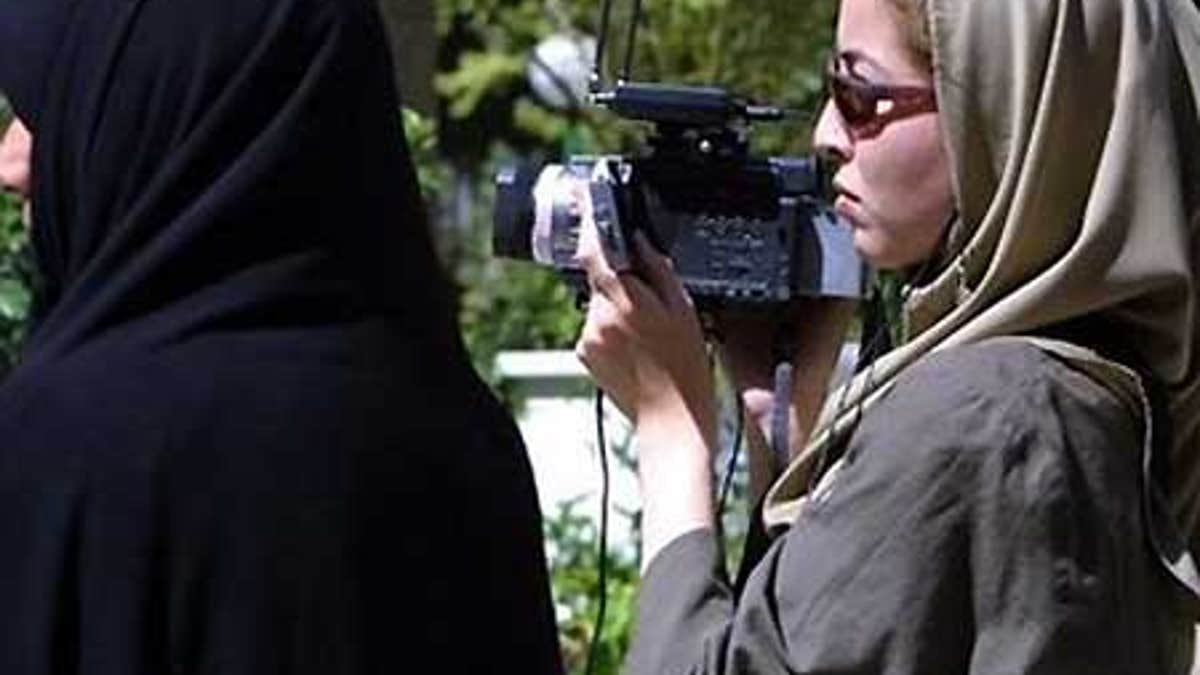
File: U.S. journalist Roxana Saberi filming in Tehran. (AFP)
TEHRAN, Iran – Iran may reconsider an eight-year jail term for an American journalist during her appeal, the judiciary spokesman said Tuesday in an indication her sentence will be commuted.
The statement was the latest hint Iran could be backing off from the imprisonment of 31-year-old Roxana Saberi on charges of spying for the U.S. On Monday, the judiciary chief ordered a full investigation into the case, a day after President Mahmoud Ahmadinejad urged Tehran's chief prosecutor to ensure Saberi be allowed a full defense during her appeal.
The case has been a source of tension with the U.S. at a time when President Barack Obama is trying to open a dialogue with Iran to end a decades-long diplomatic standoff. The U.S. has called the accusations against Saberi, a dual American-Iranian citizen, baseless and demanded her release.
"We can't influence the judge's verdict (but hope) the verdict will be reconsidered at the appeals court," the official IRNA news agency quoted judiciary spokesman Ali Reza Jamshidi as saying. The statement was seen as a rare prediction from the judiciary about a pending case.
Click here for photos.
Saberi, who was born in the United States and grew up in Fargo, North Dakota, moved to Iran six years ago and worked as a freelance journalist for news organizations including National Public Radio and the British Broadcasting Corp. She received Iranian citizenship because her father was born in Iran.
Iran has released few details about the charges against Saberi. She was arrested in late January and initially accused of working without press credentials. But an Iranian judge leveled a far more serious allegation against her earlier this month, charging that she passed classified information to U.S. intelligence services. Saberi's parents and the U.S. have denied that she was a spy.
She was convicted of espionage last week and sentenced after a one-day trial behind closed doors.
Iran's Intelligence Minister Gholam Hossein Mohseni Ejehi revealed a little more detail about the case Tuesday, saying the initial investigation of Saberi was done by an expert on security and counterespionage at the Intelligence Ministry before her case was referred to the court.
"The expert presented a report to the judiciary. The court investigated the report and found her guilty." IRNA quoted Ejehi as saying.
Ejehi also said that Saberi worked as an Iranian national and never asked to operate as an American journalist.
"Saberi didn't use her non-Iranian nationality. She entered Iran as an Iranian with an Iranian passport," he was quoted by IRNA as saying.
Iran has stressed that although Saberi is a dual national, the courts are treating her strictly as an Iranian citizen. That apparently is an effort to show they are not prosecuting her because she is American.
Jamshidi said Saberi's lawyer appealed the verdict, and the ruling by the appeals court will be final.
Saberi's parents, who live in Fargo but are in Iran to press for their daughter's release, told The Associated Press Monday that they had been allowed to visit their daughter in prison. Her father said his daughter was in good condition and was looking forward to the appeal.
The United States broke off diplomatic relations with Iran after its 1979 Islamic revolution and takeover of the U.S. Embassy in Tehran. Iran has been mostly lukewarm to the Obama administration's overtures. But last week, Ahmadinejad said Iran was ready for a new start.
Saberi's conviction came about two months ahead of key presidential elections in June that are pitting hard-liners against reformists, who support better relations with Washington. Ahmadinejad is seeking re-election, but the hard-liner's popularity has waned and he has been trying to draw support away from his top reformist opponent, former prime minister Mir Hossein Mousavi.
